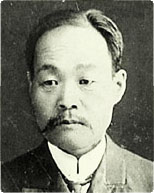Yu Kil-chun
Yu Kil-chun (Korean: 유길준 兪吉濬, 1856 – 1914) was a Korean politician, philosopher, thinker, reform activist and independence activist during the Joseon Dynasty. His nickname was Gudang, Chunmin, Guyil.
| Yu Kil-chun | |
 | |
| Korean name | |
|---|---|
| Hangul | 유길준 |
| Hanja | |
| Revised Romanization | Yu Gil-jun |
| McCune–Reischauer | Yu Kil-chun |
| Pen name | |
| Hangul | 구당, 천민, 구일 |
| Hanja | |
| Revised Romanization | Gudang, Cheonmin, Guyil |
| McCune–Reischauer | Kudang, Chonmin, Kuyil |
| Courtesy name | |
| Hangul | 성무 |
| Hanja | |
| Revised Romanization | Seongmu |
| McCune–Reischauer | Sŏngmu |
Life
changeYu Kil-chun was born in Kwangju. In his early years he studied under Park Kyu-su and Oh Kyung-suk. As a young man in 1881, he went to Meiji Japan to study at Keio University. He then went to the United States in 1884 to study mathematics. After that, he was accused of supporting the Gaehwadang (enlightenment party). He was arrested and put in jail from 1885 to 1894.
Between 1894 and 1895, Yu worked for the government of prime minister Kim Hongjip. He was Vice Minister of State for Home Office. In October 1895, Korea's King Gojong claimed that Yu was involved in the assassination of Queen Min. Kim was killed and his cabinet was disbanded. Yu went to the Russian embassy and escaped the country for exile in Japan. He returned to Korea in 1907 after he was pardoned by Emperor Sunjeong.
In 1910, when Korea was annexed by Imperial Japan, Yun started a movement against the annexation. Yu was offered the title danshaku by the Government of Japan, but he refused it. He died in 1914 of a heart problem. He was aged 58.[1]
Works
change- Seoyugyonmun (서유견문)
Notes
change- ↑ 계몽주의자, 군국주의자!:박노자 - 한겨레 21(제502호) 2004.04.01일자
Sources
change- De Ceuster, Koen. “The World in a Book: Yu Kilchun’s Soyu kyonmun.” In Remco E. Breuker, ed. Korea in the Middle: Korean Studies and Area Studies: Essays in Honour of Boudewijn Walraven. Leiden: CNWS Publications, 2008.
Other websites
change- 구당 유길준(矩堂 兪吉濬):2003년 12월의 문화 인물 Archived 2014-01-08 at the Wayback Machine (in Korean)
- Yu Kil-chun Archived 2014-01-08 at the Wayback Machine (in Korean)
- Yu Kil-chun Archived 2016-03-03 at the Wayback Machine, Korean historical person information (in Korean)
- Yu Gil-jun Archived 2012-07-13 at Archive.today (in Korean)
- Yu Gil-jun Archived 2016-03-03 at the Wayback Machine (in Korean)
- Yu Gil-jun Archived 2014-01-08 at the Wayback Machine (in Korean)